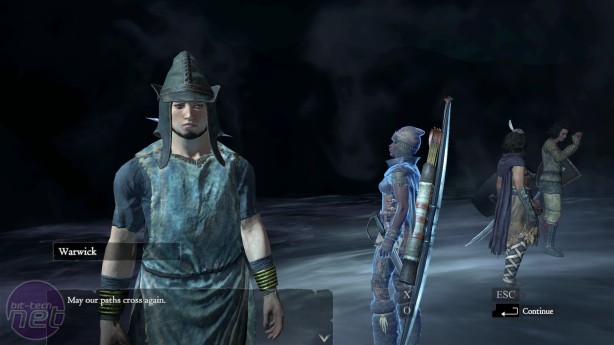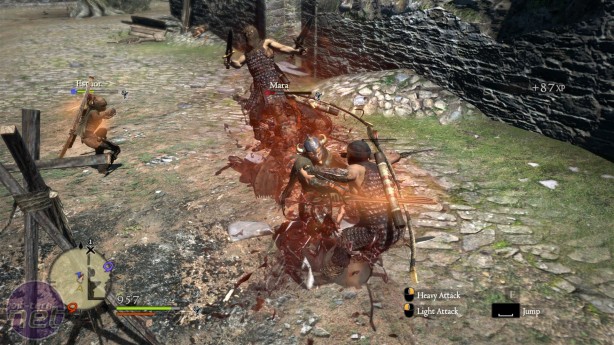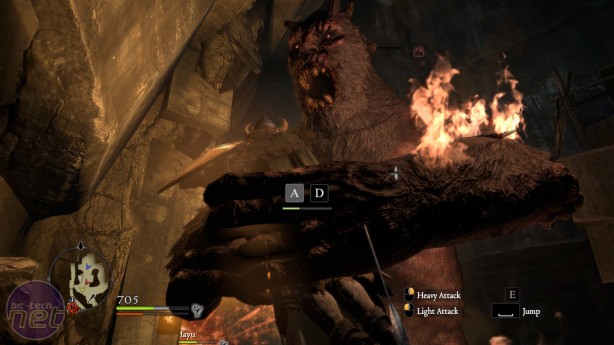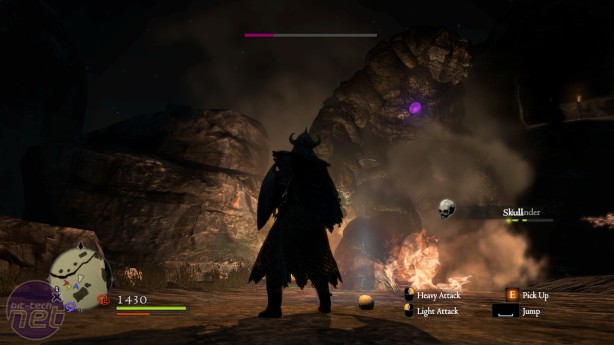
Dragon's Dogma grasps the meaning of the word "adventure" like few other RPGs, that trials and peril during the journey are as important as upon arrival at the destination. It understands the significance of coming to a fork in the road and being uncertain as to which direction is the right one, the trepidation of watching the sun set when you're still a distance from safety, the nervous thrill of taking a shortcut through an ancient mountain tunnel, where terrible danger lurks in the shadows. Unfortunately, because it doesn't explain itself particularly well in the offing, the player's response to this design is as likely to be rebuffed as allured.
As is so often the case with fantasy RPGs, you're accompanied on your quest by a party of side-characters. But Dragon's Dogma has a very different approach to party formation. Rather than a pre-written series of characters, you select from a large pool of randomly generated "Pawns." Devoid of emotion, these human-like creatures have banded together to form a guild of mercenaries dedicated to aiding the Arisen. One of these pawns you create yourself, while others can be hired as you progress through the game. You can even hire the pawns of other players through a fascinating indirect multiplayer component.
The pawns themselves are ingenious creations, helping you navigate, aiding you in combat, and learning new strategies to battle enemies the longer you spend time with them. They also constantly comment on the world as you travel, taking note of dangers ahead, difficult terrain and so on. Their utterances repeat themselves too often - I have been thoroughly schooled in the fact that wolves are weak to fire - but overall it adds to that sense of adventure.
The pawn system truly comes into its own during combat with the huge monsters you stumble upon periodically. These encounters are undoubtedly the highlight of the game, epic battles against creatures that can kill you in a couple of swipes, and require teamwork and tactics to take down. The ingenious "grapple" system enables characters to actually climb onto these monsters, attacking specific areas for extra damage. The Cyclops, for example, takes extra damage if you stab it in the eye, while grabbing a limb of the soaring Griffin unbalances it and prevents it from flying off too far. Clambering across these vast creatures as they leap and flail to shake you off is tremendous fun.
Outside of these encounters, the combat is slick and snappy, but otherwise, it's a fairly traditional hack 'n' slash affair that lacks the nuance of Dark Souls or the lethality of the Witcher. The warrior class is also distinctly underpowered compared to the mage and rogue classes, lacking a ranged component which makes fighting the many flying enemies problematic.
Sadly, this isn't the game's only issue. The inventory and upgrade system is horribly designed. Selecting and equipping items is divided between two separate screens, and a Pawn need to be given an item via the inventory screen before it can be equipped in the equipment screen. Furthermore, buying and selling items can only be done separately, and learning and setting skills are arbitrarily divided. The upshot of this is organising your inventory is an arduous timesink in a game that already demands a sizeable chunk of life.
In addition, while the monsters have character aplenty, the same can't be said for the game's human individuals. Conversations are terse and humourless, used mainly to move whatever quest you're embarking upon onto the next stage. The Arisen is a silent protagonist with all the personality of a root vegetable, although I suppose that makes them ideal company for a group of emotionless Pawns. Quests tend to be more interesting for the areas you explore on the way rather than what awaits at your destination. This is fine when it takes you down a new road, but can become tiresome when you need to traverse the path between Cassardis and Gran Soren for the fourteenth time. And while Gransys is a fantastically designed world, it sticks pretty rigidly to the Tolkien template, with little original to offer in terms of fantasy storytelling.
The situation is a little different for the Dark Arisen expansion, which introduces a new, higher-level area off the Coast of Cassardis. Bitterblack isle trades size for environmental complexity, a claustrophobic maze of shadowy chambers and twisting corridors. It's also very obviously influenced by Dark Souls, evident in the darker, eerier aesthetic, the new monsters which include mimic-like treasure chests. It also introduces an item that allows infinite fast-travel, which helps to negate some of the longer journeys should you become tired of them.
Thematically traditional, mechanically experimental and uneven in execution, Dragon's Dogma is a game that you have to meet halfway. But the longer you stick with it, the more rewarding it becomes. It may not have given the best first impression, but it eventually fought its way to my heart. Recommended.
As is so often the case with fantasy RPGs, you're accompanied on your quest by a party of side-characters. But Dragon's Dogma has a very different approach to party formation. Rather than a pre-written series of characters, you select from a large pool of randomly generated "Pawns." Devoid of emotion, these human-like creatures have banded together to form a guild of mercenaries dedicated to aiding the Arisen. One of these pawns you create yourself, while others can be hired as you progress through the game. You can even hire the pawns of other players through a fascinating indirect multiplayer component.
The pawns themselves are ingenious creations, helping you navigate, aiding you in combat, and learning new strategies to battle enemies the longer you spend time with them. They also constantly comment on the world as you travel, taking note of dangers ahead, difficult terrain and so on. Their utterances repeat themselves too often - I have been thoroughly schooled in the fact that wolves are weak to fire - but overall it adds to that sense of adventure.
The pawn system truly comes into its own during combat with the huge monsters you stumble upon periodically. These encounters are undoubtedly the highlight of the game, epic battles against creatures that can kill you in a couple of swipes, and require teamwork and tactics to take down. The ingenious "grapple" system enables characters to actually climb onto these monsters, attacking specific areas for extra damage. The Cyclops, for example, takes extra damage if you stab it in the eye, while grabbing a limb of the soaring Griffin unbalances it and prevents it from flying off too far. Clambering across these vast creatures as they leap and flail to shake you off is tremendous fun.
Outside of these encounters, the combat is slick and snappy, but otherwise, it's a fairly traditional hack 'n' slash affair that lacks the nuance of Dark Souls or the lethality of the Witcher. The warrior class is also distinctly underpowered compared to the mage and rogue classes, lacking a ranged component which makes fighting the many flying enemies problematic.
Sadly, this isn't the game's only issue. The inventory and upgrade system is horribly designed. Selecting and equipping items is divided between two separate screens, and a Pawn need to be given an item via the inventory screen before it can be equipped in the equipment screen. Furthermore, buying and selling items can only be done separately, and learning and setting skills are arbitrarily divided. The upshot of this is organising your inventory is an arduous timesink in a game that already demands a sizeable chunk of life.
In addition, while the monsters have character aplenty, the same can't be said for the game's human individuals. Conversations are terse and humourless, used mainly to move whatever quest you're embarking upon onto the next stage. The Arisen is a silent protagonist with all the personality of a root vegetable, although I suppose that makes them ideal company for a group of emotionless Pawns. Quests tend to be more interesting for the areas you explore on the way rather than what awaits at your destination. This is fine when it takes you down a new road, but can become tiresome when you need to traverse the path between Cassardis and Gran Soren for the fourteenth time. And while Gransys is a fantastically designed world, it sticks pretty rigidly to the Tolkien template, with little original to offer in terms of fantasy storytelling.
The situation is a little different for the Dark Arisen expansion, which introduces a new, higher-level area off the Coast of Cassardis. Bitterblack isle trades size for environmental complexity, a claustrophobic maze of shadowy chambers and twisting corridors. It's also very obviously influenced by Dark Souls, evident in the darker, eerier aesthetic, the new monsters which include mimic-like treasure chests. It also introduces an item that allows infinite fast-travel, which helps to negate some of the longer journeys should you become tired of them.
Thematically traditional, mechanically experimental and uneven in execution, Dragon's Dogma is a game that you have to meet halfway. But the longer you stick with it, the more rewarding it becomes. It may not have given the best first impression, but it eventually fought its way to my heart. Recommended.


MSI MPG Velox 100R Chassis Review
October 14 2021 | 15:04













Want to comment? Please log in.